This article was medically reviewed by Luba Lee, FNP-BC, MS. Luba Lee, FNP-BC is a Board-Certified Family Nurse Practitioner (FNP) and educator in Tennessee with over a decade of clinical experience. Luba has certifications in Pediatric Advanced Life Support (PALS), Emergency Medicine, Advanced Cardiac Life Support (ACLS), Team Building, and Critical Care Nursing. She received her Master of Science in Nursing (MSN) from the University of Tennessee in 2006.
There are 16 references cited in this article, which can be found at the bottom of the page.
This article has been viewed 97,937 times.
Bad breath is an issue that everyone experiences from time to time. In most cases, it's nothing serious and can be cured by brushing your teeth or taking a breath mint. Certain lifestyle changes like smoking less, good oral hygiene, and improving your hydration can also clear up chronic bad breath. In a small number of cases halitosis, or chronic bad breath, is caused by serious medical issues including diabetes, respiratory tract or sinus infections, H. pylori, SIBO, or liver and kidney disease. In these cases, you'll need to work with your doctor to treat the underlying condition causing your bad breath.[1]
Steps
Stopping Bad Breath Immediately
-
1Brush your teeth to clear up most cases of bad breath. Brushing your teeth will keep your mouth healthy and smelling great. Brush for at least 2 minutes each time, in order to remove odor-causing bacteria from your tongue and the inside of your mouth. Brush your teeth at least twice a day and also whenever you notice that your breath smells a little off.[2]
- When brushing your teeth, don't forget to brush your tongue! Brushing your tongue cleans off old food and bacteria that may be causing the majority of the unpleasant smells coming from your mouth.
- If you find that your bad breath persists after brushing and flossing, try using a tongue scraper after brushing your teeth in the morning and at night. Tongue scrapers remove tough food particles and bacteria from your tongue and improve the smell of your breath.[3] Purchase a tongue scraper at a local drugstore.
-
2Take a sugar-free breath mint to clear up bad breath within 30 seconds. If you're worried about bad breath during the day, carry some sugar-free mints around with you. If your breath needs freshening, pop one in! For the best effect and the freshest breath, use mints with a relatively mild scent like peppermint or wintermint.[4]
- While breath mints and gum work quickly, they're only a temporary solution to having bad breath. After you've taken a breath mint, your bad breath may return within 30-60 minutes.
Advertisement -
3Try chewing sugar-free gum to hydrate and freshen your mouth. Popping a piece of mint-flavored chewing gum into your mouth is a quick, easy way to improve and freshen up your breath for a few hours. The scent from the chewing gum masks unpleasant breath odors, and the chewing will also hydrate your mouth. This will, in effect, rinse off your tongue and sweep odor-causing bacteria down your throat.[5]
- Since most people don't brush their teeth after chewing gum, opt for a sugar-free variety. Sugar-free gum will freshen up your breath just as well as sugar gum, but won't leave a sugary residue on your teeth for the rest of the day.
-
4Gargle a cap full of mouthwash to freshen your mouth. Mouthwash is a great way to quickly freshen up your mouth before you step out for a date, dinner, or a social event. Fill the cap of the mouthwash container with the liquid and gargle it for 20-30 seconds. Then spit it out and rinse out the mouthwash from your mouth with a mouthful of tap water.[6]
- Like gum and mints, mouthwash is only a temporary fix to bad breath. Also, using mouthwash more than 1-2 times per day can actually worsen your breath by agitating the tissue within your mouth and drying out your oral cavity.
- You may also consider trying oil pulling as a way to rinse your teeth and prevent bad breath. Swish 1 fl oz (30 mL) of coconut or sesame oil in your mouth for about 10 minutes, and then spit out the oil.[7]
-
5Clean your dentures every night to remove any bad smells. If you wear dentures, remove them each night before you go to bed. Use lukewarm tap water and hand soap to scrub your dentures and remove any buildups of bacteria and plaque. If you neglect to clean your dentures, they’ll start to smell within a few days and can lead to bad breath.[8]
- Instead of soap and water, you can also use a denture-cleaning pad or denture cream to clean the dentures.
Making Lifestyle Changes to Reduce Bad Breath
-
1Stay hydrated to keep your mouth smelling fresh. Many cases of bad breath are caused by a dry mouth, which allows bacteria to flourish. Avoid this by drinking plenty of water throughout the day to keep your mouth wet and fresh smelling. Stay away from fluids that dehydrate you, like coffee, alcohol, and colas, which can actually worsen your bad breath.[9]
- To keep hydrated, adults should drink at least 15.5 cups (3.7 L) per day.[10]
- Some prescription medications can also cause you to have a dry mouth. If you’re not sure whether a medication you’re on dries out your mouth, ask your doctor.
-
2Floss daily to remove food particles that can cause bad breath. Brushing your teeth only cleans about 60% of the surface of your teeth, leaving 40% still dirty. Over time, the plaque and bacteria on these dirty surfaces of your teeth can start to smell bad, giving you potent breath. Prevent this potential bad breath by flossing daily.[11]
- You’ll be most likely to remember to floss if you do it at a consistent time day after day. For example, floss right after dinner each night.
-
3Stop smoking to improve the smell of your breath. Not only are cigarettes (and other forms of tobacco) bad for your health, but they give smokers chronic bad breath. Smoking also dries out your mouth (similarly to alcohol), and allows foul-smelling bacteria to build up in the oral cavity.[12]
- Even if you don’t smoke cigarettes, other types of smoking can lead to bad breath. Smoking cigars, vaping, and smoking marijuana can all cause bad-smelling breath.
-
4Cut back on the amount of alcohol you drink to decrease bad breath. Drinking alcohol alters the balance of bacteria in your mouth, leading to frequent bad breath. All types of alcohol (but especially hard liquors like whiskey and vodka) also dry out your mouth and lead to stale-smelling breath. So, if you’re a drinker and you find yourself with frequent bad breath, cut back on the alcohol consumption.[13]
- In order to be considered a moderate drinker, men under 65 should have no more than 2 drinks a day. Women of all ages and men over 65 should have no more than 1 drink a day.[14]
-
5
-
6Reduce your intake of processed foods in favor of whole foods. Eating lots of processed foods and foods that are loaded with added sugar may make bad breath worse. However, getting most of your nutrients from whole foods, such as fruits and veggies, may help to improve bad breath.[17] Cut back on the amount of processed foods and added sugars you consume and incorporate more fresh fruits and vegetables.
- Try drinking fresh fruits vegetable smoothies.
- Consider a detox diet to help eliminate unhealthy foods from your diet.
-
7Snack on fresh, crispy fruit and veggies as part of a daily diet. Snacking on crispy and liquid-rich veggies and fruits is a great way to freshen your mouth. They prevent bad breath by removing food particles and bacteria from your tongue and the roof of your mouth. Eating these foods as a snack between meals can also prevent foul-smelling stomach acids from making your breath smell.[18] Before lunch or after dinner, eat 4-5 pieces of foods like:
- Apple slices
- Celery sticks
- Carrot sticks
- Bell peppers
Treating Medically-Caused Halitosis
-
1See a dentist 1–2 times every year for a general cleaning. Regular dental checkups and cleanings are crucial to maintaining strong, healthy teeth. Your dentist can identify and stop issues that cause bad breath, like cavities and tooth decay. General cleanings can also help prevent bad breath by keeping your teeth and gums free from odorous bacteria. If you notice that you have bad breath that isn’t fixed by a mint or brushing your teeth, bring the issue up to your dentist.[19]
- If your dentist sees any medical issues that may lead to bad breath—e.g., receding gums—they can point it out to you before the problem becomes severe.
-
2Visit your dentist if you suspect you have gum disease. Gum disease causes your gums to pull back from your teeth. A side effect of gum disease is that bacteria can build up in the pockets between your receding gums and your teeth. This typically results in extreme and chronic bad breath. If you notice your gums receding and can’t seem to get rid of your bad breath, visit your dentist and ask about gum disease.[20]
- If you do have gum disease, your dentist will be able to scrape the odor-causing bacteria out of the pockets between your gums and teeth.
- If your gum disease is advanced or if you need surgery, your dentist may refer you to a periodontist (gum specialist).
-
3See your doctor if nose or throat pain accompany your bad breath. In some situations, sinus infection or inflammation can cause bad breath, as can general inflammation of soft tissue in your nose and throat. As bacteria build up in these kinds of infection, they’ll cause noticeably bad breath that won’t be treated through dental care or hydration.[21]
- Bacteria-covered tonsil stones can also produce bad breath. While these are uncommon, it’s worth asking your doctor to check your tonsils if you can’t determine the cause of your bad breath.
- Your general practitioner may refer you to an ENT specialist to treat severe infections.
-
4Tell your doctor if stomach pain accompanies your bad breath. Certain stomach and intestinal conditions can produce halitosis. For example, if an unhealthy level of the bacteria H. pylori has built up in your stomach, it may be causing your chronic bad breath. Similarly, stomach ulcers and various stomach reflux diseases can cause foul-smelling breath.[22]
- Some of these stomach and intestinal medical conditions can be treated with prescription medications. For harder-to-treat conditions, your doctor may refer you to a gastroenterologist.
References
- ↑ https://www.hopkinsmedicine.org/health/conditions-and-diseases/halitosis-bad-breath
- ↑ https://www.mayoclinic.org/diseases-conditions/bad-breath/diagnosis-treatment/drc-20350925
- ↑ https://www.verywellhealth.com/home-remedies-for-bad-breath-89268
- ↑ https://www.webmd.com/oral-health/features/bad-breath-good-and-bad-foods
- ↑ https://www.webmd.com/oral-health/features/bad-breath-good-and-bad-foods
- ↑ https://www.webmd.com/oral-health/features/get-rid-bad-breath
- ↑ https://www.ncbi.nlm.nih.gov/pubmed/21911944
- ↑ https://www.nhs.uk/conditions/bad-breath/
- ↑ https://www.mayoclinic.org/diseases-conditions/bad-breath/diagnosis-treatment/drc-20350925
- ↑ https://www.mayoclinic.org/healthy-lifestyle/nutrition-and-healthy-eating/in-depth/water/art-20044256
- ↑ https://www.mouthhealthy.org/en/az-topics/f/flossing-steps
- ↑ https://www.mouthhealthy.org/en/az-topics/h/halitosis
- ↑ https://www.nbcnews.com/health/health-news/beer-breath-drinking-alcohol-may-give-you-more-bad-breath-n868391
- ↑ https://www.mayoclinic.org/healthy-lifestyle/nutrition-and-healthy-eating/in-depth/alcohol/art-20044551
- ↑ https://www.ncbi.nlm.nih.gov/pmc/articles/PMC3412664/
- ↑ https://www.ncbi.nlm.nih.gov/pubmed/20659698
- ↑ https://www.webmd.com/oral-health/features/bad-breath-good-and-bad-foods
- ↑ https://www.webmd.com/oral-health/features/bad-breath-good-and-bad-foods
- ↑ https://www.mayoclinic.org/diseases-conditions/bad-breath/diagnosis-treatment/drc-20350925
- ↑ https://www.mayoclinic.org/diseases-conditions/bad-breath/diagnosis-treatment/drc-20350925
- ↑ https://healthtalk.unchealthcare.org/what-your-bad-breath-might-be-telling-you/
- ↑ https://www.nhs.uk/conditions/bad-breath/
- ↑ https://www.mayoclinic.org/diseases-conditions/bad-breath/symptoms-causes/syc-20350922
About This Article
To treat bad breath immediately, brush your teeth, gargle with mouthwash, and pop a piece of sugar-free gum or a breath mint into your mouth. To treat chronic bad breath, be sure to stay hydrated and floss every day to remove food particles from in between your teeth. Avoiding cigarettes and reducing your alcohol intake can also help. For tips on dental procedures you can try to treat bad breath, read on!
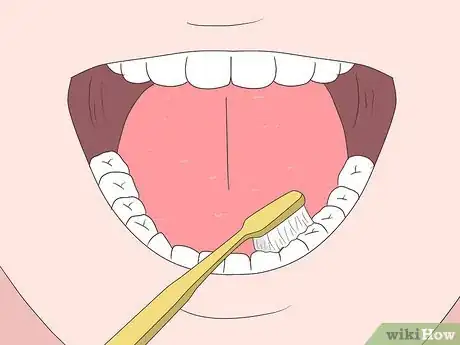
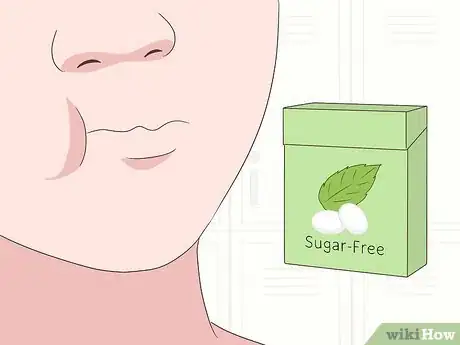
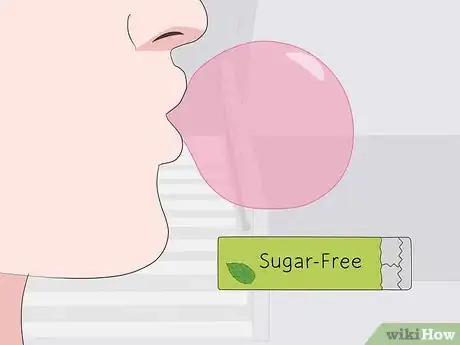
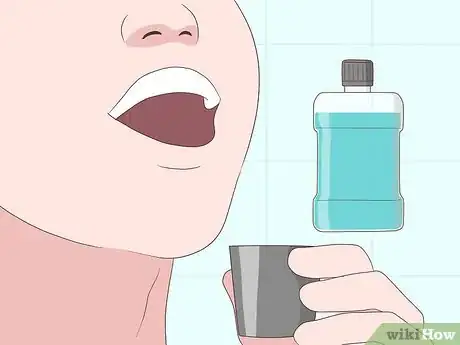
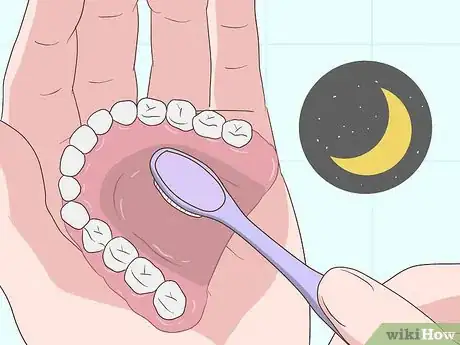
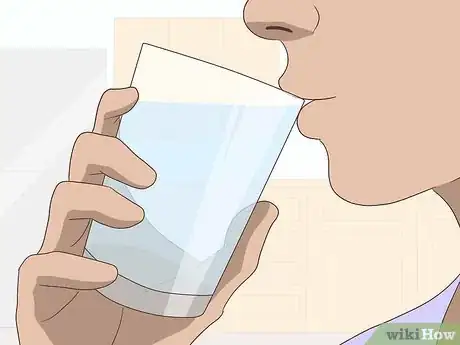
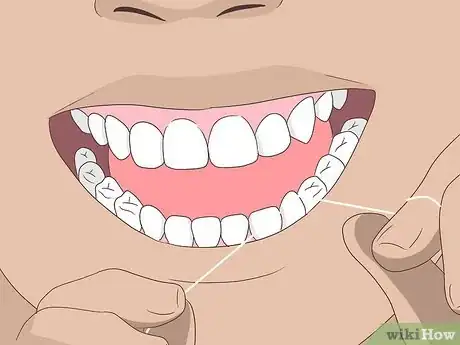
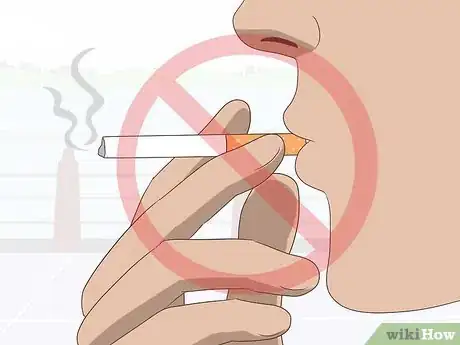
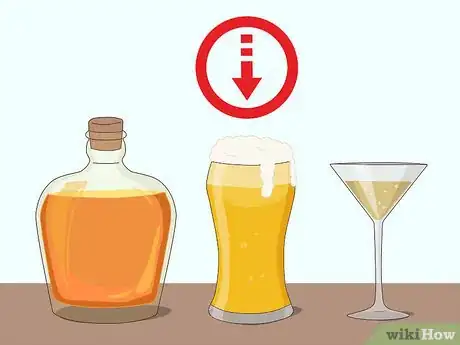
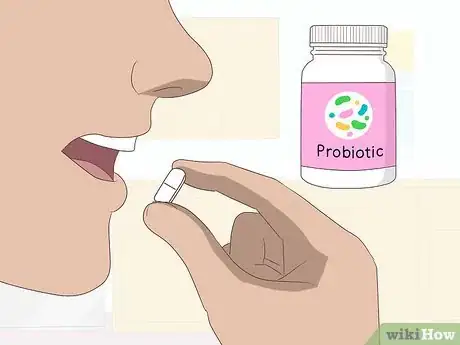
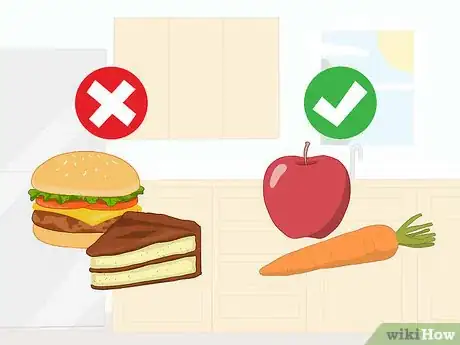
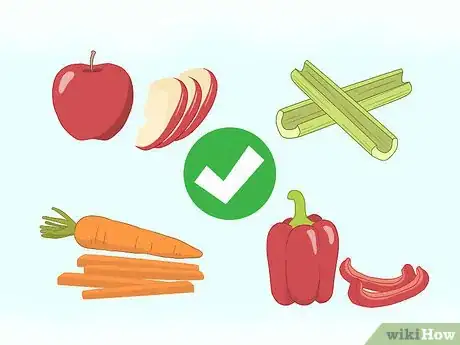
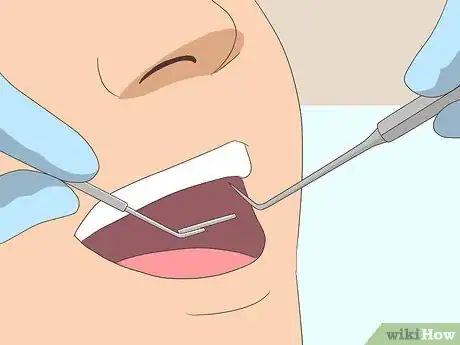
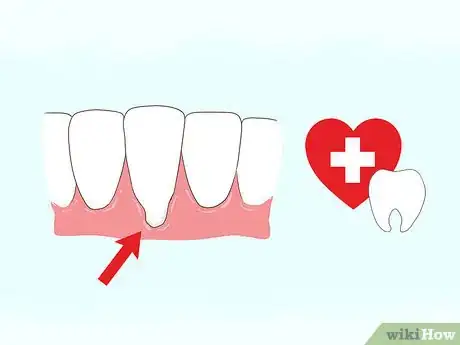

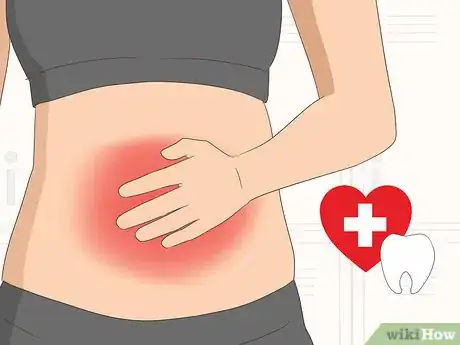



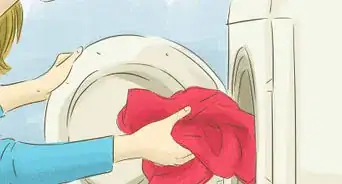

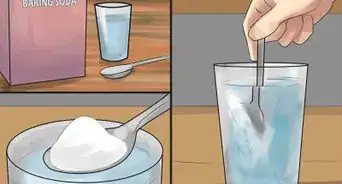
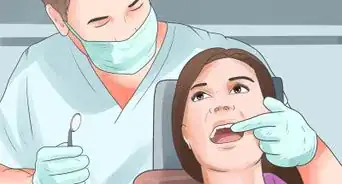
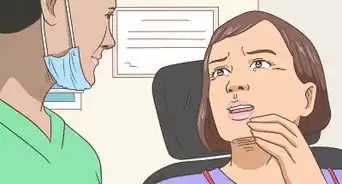
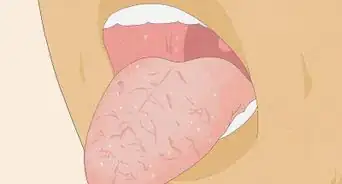











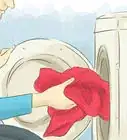



































Medical Disclaimer
The content of this article is not intended to be a substitute for professional medical advice, examination, diagnosis, or treatment. You should always contact your doctor or other qualified healthcare professional before starting, changing, or stopping any kind of health treatment.
Read More...